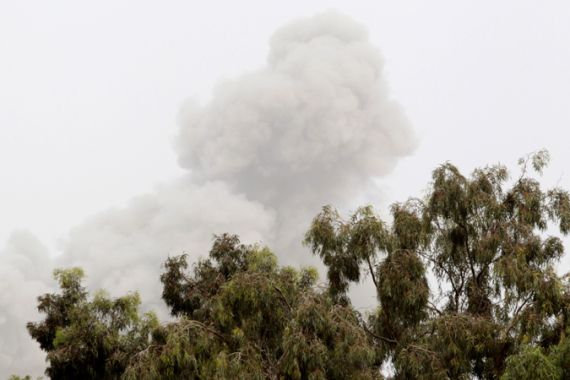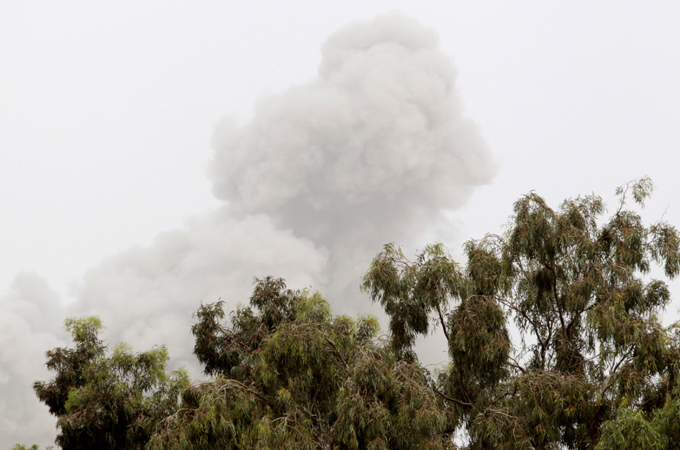NATO strikes rock Libyan capital
Several explosions reported near Libyan leader Muammar Gaddafi’s compound following rare daytime attacks.

 |
| NATO has increasingly been hitting targets in Tripoli over recent days [Reuters] |
Several huge explosions have been reported from near Libyan leader Muammar Gaddafi’s residential compound in central Tripoli, the Libyan capital.
The Reuters news agency reported on Tuesday that the explosions appeared to have taken place in the vicinity of Gaddafi’s Bab al-Aziziya compound, which had been struck several times in recent weeks.
The explosions sent a column of grey smoke into the sky.
 |
The AFP news agency reported that four explosions were heard from the centre of the city, while the Associated Press reported that low-flying NATO aircraft carried out nine successive attacks in the capital on Tuesday morning.
The strikes hit the Popular Guard compound and the Revolutionary Guard compound, a Libyan official told reporters in the capital.
Tripoli has come under increased attack from NATO bombers in recent days, with strikes occuring every few hours.
On Monday, NATO air raids on the capital targeted the communications of the battered government, hitting offices of the state broadcaster and military intelligence headquarters, officials said.
Rebel gains
The latest air strikes follow recent gains made by rebels seeking to end Gaddafi’s more than four-decades rule.
Reports on Monday said the rebels had entered the northwestern town of Yafran, previously held by government forces.
 |
Youssef Boudlal, a Reuters photographer in Yafran, said the town had been wrested by the rebels.
“We are inside the town … There is no sign of any Gaddafi forces. I can see the rebel flags … We have seen posters and photos of Gaddafi that have been destroyed,” Boudlal said.
Meanwhile, Anders Fogh Rasmussen, NATO’s secretary-general, said the alliance had damaged or destroyed 1,800 military targets in Libya so far, thereby degrading Gaddafi’s power to the extent that he would certainly be forced to step down.
“We have made considerable progress,” he said before a meeting of NATO defence ministers due to take place in Brussels on Monday.
“We have taken the momentum, we have turned the tide of terror unleashed by the Gaddafi regime, we have saved countless lives and we have seriously degraded the ability of the Gaddafi regime to attack civilians.”
Diplomatic efforts
On Tuesday, Russian envoy Mikhail Margelov arrived in the rebel stronghold of Benghazi, in the east of the country, to hold meetings with the Libyan Transitional National Council (TNC). Margelov, acting as Russian President Dmitry Medvedev’s representative, is the first top Russian official to hold talks with the rebels.
“We have come to Benghazi to facilitate dialogue between the two camps,” Margelov told reporters as he arrived..
Abdul-Ati al-Obeidi, the Libyan foreign minister, meanwhile, arrived in Beijing on Tuesday for talks with Chinese officials.
China has pointedly avoided joining international calls for Gaddafi to step down, but did not exercise its veto power at the United Nations Security Council during the vote authorising the use of force against the Libyan government.
On Friday, China said it was reaching out for the first time to the Libyan rebel council, with the country’s ambassador to Qatar meeting with the head of the TNC in Doha, the Qatari capital.
Hong Lei, the Chinese foreign ministry’s spokesman, told reporters at a regular briefing that talks with al-Obeidi in Beijing would focus on the need for a political solution to the Libyan crisis.